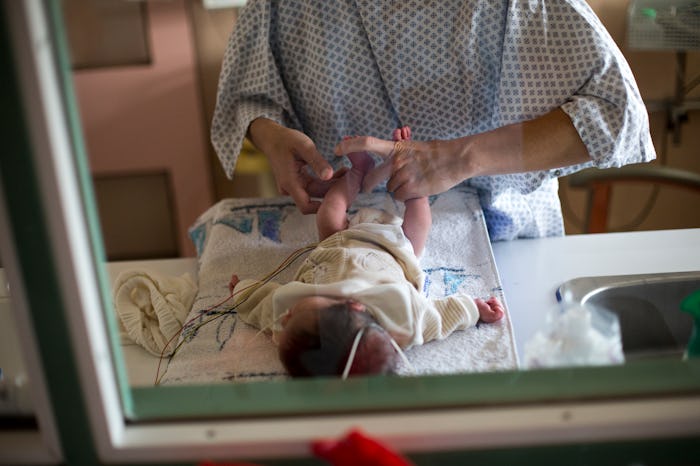Life

White NICU Babies In California Get Better Care, & It Indicates A Horrible Trend
Shamefully, racial inequities in the United States are about as embedded in America as apple pie — and that awful truth extends to health care. Case in point: Research published Monday in the journal Pediatrics indicates that white babies get the best NICU care in California. And although the study is brand new, the problems it highlights are anything but. The fact that white and Asian babies in California neonatal intensive care units generally receive better treatment than their counterparts of other races is further evidence that something seriously needs to change when it comes to both maternal and infant medical care for minority populations.
To reach the conclusion that racial disparities do exist in NICU treatment, researchers from the Stanford University School of Medicine analyzed the care and outcomes of nearly 19,000 infants born between 2010 and 2014 in 134 California hospitals. What they found using a quality of care scoring system was "troubling": when compared to white and Asian NICU patients, African American babies had "slightly lower scores," and the scores for Hispanics and others, including American Indian and Alaska Natives, were "significantly lower," according to SF Gate.
The measures included in the scoring included whether babies received steroids to help mature their lungs, whether they got an eye exam, whether they contracted an infection in the hospital, whether they received breast milk after discharge, how fast they grew, and more.
For study senior author and associate professor of pediatrics Dr. Jochen Profit, the racial differences in care showed that there is serious room for improvement in California's hospitals, as he said in a press release, according to Eureka Alert:
There's a long history of disparity in health care delivery, and our study shows that the NICU is really no different. Unconscious social biases that we all have can make their way into the NICU. We would like to encourage NICU caregivers to think about how these disparities play out in their own units and how they can be reduced.
White babies did not receive better treatment across the board, however. For example, black babies had a faster growth rate, and they experienced better care in some of the hospitals studied. But in hospitals with better quality of care overall, the disparity between white babies and others widened in favor of the white babies. That remained true even when the researchers adjusted their findings to account for factors like length of pregnancy and whether the mom received prenatal care.
The fact that minority babies generally get worse care than white babies is hardly a surprise. It's common knowledge that the infant mortality rate in the United States is incredibly high compared to other developed nations. But the outlook is even worse for babies born to black women: according to Slate, they are two times as likely to die in their first year of life than they would have been if they had been born to a white woman. Social and economic barrier contribute to this problem.
The United States also has a big problem when it comes to maternal mortality. Newsweek reported in July 2016 that about 1,200 American moms die of childbirth complications each year — a rate that is twice what it was 25 years ago. Just as striking, though, is the fact that black moms see their likelihood of death quadrupled over that of white women.
There are many reasons this is the case. As Newsweek's Rebecca Grant wrote, black women are generally in poorer health (as the result of racial barriers and systemic inequality), making them more susceptible to high-risk pregnancies. Members of poor and minority populations are more likely to start out a pregnancy with chronic conditions like obesity, hypertension, and diabetes.
These same populations also experience barriers to family planning services. This means they may have babies closer together, which increases the risk of complications, according to Newsweek. Poor and minority women are also more likely to be uninsured, making it harder to find a doctor and get the prenatal care they need. Logistical barriers like finding transportation and getting time off work can also make securing prenatal care more of a challenge.
Clearly, it is imperative that medical professionals work to mitigate these problems — as well as the racial bias — that can lead to worse outcomes for minority babies and moms.